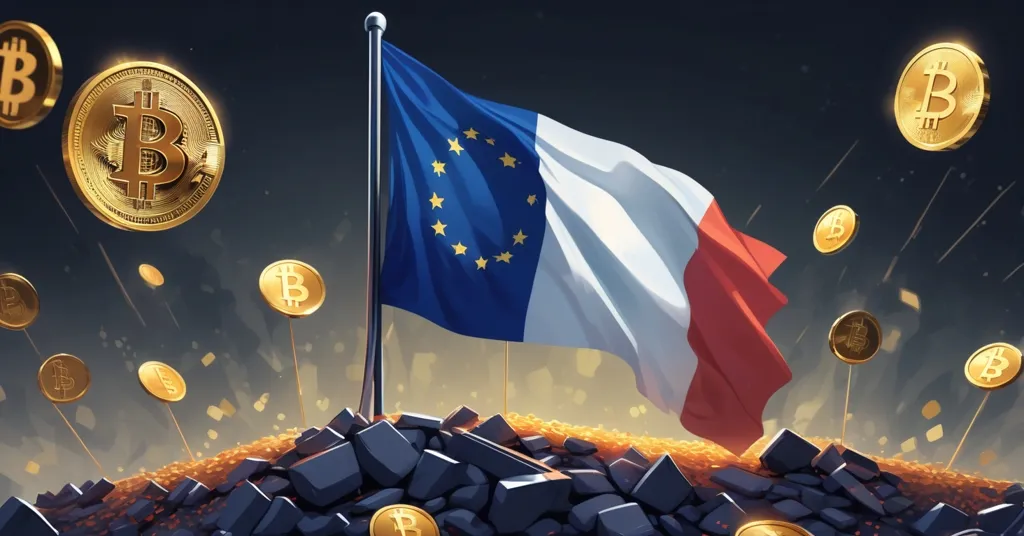France Rejects Digital Euro, Bets Big on Bitcoin Reserve and Euro Stablecoins

France Rejects Digital Euro, Proposes Bitcoin Reserve and Euro Stablecoins in Bold Defiance
France has dropped a bombshell in the financial world as its National Assembly proposes to block the European Central Bank’s (ECB) planned digital euro, instead placing a massive bet on Bitcoin and euro-denominated stablecoins. Spearheaded by Éric Ciotti and members of the UDR on October 22, 2025, this resolution isn’t just a policy shift—it’s a declaration of war against centralized financial control and a loud endorsement of decentralized innovation.
- Digital Euro Rejection: France aims to halt the ECB’s central bank digital currency (CBDC) over surveillance and stability fears.
- Bitcoin Reserve Plan: A target of 2% of Bitcoin’s total supply (about 420,000 BTC) to be amassed over 7-8 years.
- Euro Stablecoin Push: Regulatory changes sought to boost euro-based tokens and ease crypto lending barriers.
Challenging the Digital Euro: A Stand Against Surveillance
The ECB has been diligently working on its digital euro since November 2023, with a preparation phase set to wrap by the end of 2025 and a potential rollout slated for 2029, as stated by ECB official Piero Cipollone. Yet, French lawmakers are slamming on the brakes, citing serious risks tied to a central bank digital currency. Their primary fear? Unchecked surveillance. Critics within the National Assembly draw chilling parallels to China’s digital yuan, a system lambasted for enabling the government to track every transaction and freeze funds at will. A digital euro, they argue, could hand the ECB similar powers, eroding personal privacy under the guise of modernization.
Beyond privacy, there’s a pragmatic economic concern: financial instability. If citizens can deposit money directly with the ECB through a digital euro, traditional banks might see a mass exodus of funds, undermining their role as financial intermediaries. This could trigger a domino effect, destabilizing the broader banking system across the Eurozone. For everyday folks, this isn’t just a policy debate—it’s about losing control over hard-earned money to a faceless bureaucracy. France’s stance is clear: centralized digital cash is a Pandora’s box they’re not willing to open, favoring instead innovative solutions like Bitcoin over CBDCs.
France’s Bitcoin Ambitions: A Decentralized Power Play
Instead of bowing to the ECB’s vision, France is turning to Bitcoin, the original cryptocurrency and a beacon of decentralization. The resolution calls for a national Bitcoin reserve of roughly 420,000 BTC—equivalent to 2% of the total supply—to be accumulated over the next 7 to 8 years. This isn’t pocket change; at current market values, we’re talking billions of euros. The funding strategy is multifaceted: mining Bitcoin using surplus energy (a nod to France’s nuclear-heavy energy mix, which often generates excess power), retaining Bitcoin seized from criminal investigations, and redirecting savings from other budget allocations. They’re even considering allowing tax payments in Bitcoin, though this hinges on constitutional approval.
For the uninitiated, Bitcoin operates on a blockchain—a public, tamper-proof digital ledger maintained by a global network of computers with no central authority. It’s a direct counter to systems like CBDCs, offering a store of value and hedge against inflation outside government control. France’s plan signals a recognition of Bitcoin not just as a speculative plaything for risk-taking investors online, but as a strategic asset. If pulled off, this could position France as a pioneer among major economies, echoing smaller nations like El Salvador, which made Bitcoin legal tender in 2021.
But let’s not pop the champagne just yet. Accumulating that much Bitcoin is a logistical nightmare, and its notorious price volatility could turn this reserve into a budgetary disaster if the market crashes. Mining with surplus energy sounds eco-friendly on paper, but the infrastructure costs and inevitable backlash from environmental activists—who’ve long criticized Bitcoin’s energy footprint—could derail the plan. France might have the nuclear capacity to pull it off, but public perception is a beast of its own.
Stablecoin Push for Sovereignty: Breaking the Dollar’s Grip
While Bitcoin represents a long-term bet on decentralization, euro-denominated stablecoins are France’s shorter-term play for financial stability and independence. Stablecoins are cryptocurrencies pegged to a stable asset, often a fiat currency like the euro, designed to avoid the wild price swings of Bitcoin or other altcoins like Ethereum. The problem? The stablecoin market, valued at $230 billion according to IMF data, is overwhelmingly dominated by U.S. dollar-based tokens, with $210 billion tied to the greenback compared to a puny $259 million for the largest euro stablecoin. This means Europeans are indirectly tethered to U.S. monetary policy—a bitter pill for a bloc obsessed with autonomy.
France wants to rewrite the rules by pushing for adjustments to the EU’s Markets in Crypto-Assets (MiCA) regulations, a framework governing digital assets. The goal is to make it easier for European banks and companies to issue euro stablecoins, fostering a homegrown alternative. Beyond sovereignty, these tokens could revolutionize cross-border payments within the EU and integrate seamlessly into decentralized finance (DeFi) protocols—think lending or trading platforms without middlemen. Compare this to dollar-based giants like USDT or USDC, which dominate global crypto transactions, and you see the massive gap France aims to close. They’re also advocating for lighter Basel prudential rules, which are international banking standards currently requiring banks to hold up to 1,250% capital reserves for crypto-backed loans—an absurdly high barrier that stifles innovation.
Roadblocks Ahead: A Minefield of Challenges
Before we crown France the champion of decentralized finance, let’s play devil’s advocate and face the harsh realities. Legally, France is bound by EU frameworks, and the ECB isn’t likely to sit idly by while a member state sabotages its flagship digital euro project. Political resistance, both from other Eurozone countries and within France’s own fractured government, will be fierce. Éric Ciotti’s right-wing push might clash with President Macron’s more centrist, pro-EU leanings, turning this proposal into a domestic battleground. Historically, France has butted heads with Brussels over financial policies, but overriding the ECB’s momentum—already years in the making—feels like a long shot.
Financially, the Bitcoin reserve plan carries insane risk. A market downturn could wipe out billions in value, leaving taxpayers on the hook. And while euro stablecoins sound promising, building a market to rival dollar tokens requires trust and adoption—neither of which comes overnight. Let’s not kid ourselves: this resolution, while visionary, is walking a tightrope over a pit of bureaucratic and economic landmines.
France’s Crypto Clout: A Market Leader in Europe
Despite the hurdles, France isn’t starting from scratch. Chainalysis data reveals the country processed a staggering $180 billion in crypto flows between July 2024 and June 2025, making it one of Europe’s busiest hubs for digital assets. The Autorité des Marchés Financiers (AMF), France’s financial regulator, has been busy too, recently approving BPCE’s Hexarq for crypto custody and trading services, and granting Lise, a tokenized equity platform, approval under the EU’s DLT Pilot Regime. These aren’t just checkboxes—they’re proof of France’s commitment to blockchain leadership. Add to that a thriving startup scene, with projects leveraging France’s crypto-friendly tax policies, and you’ve got a nation poised to drag the rest of Europe into the future of finance.
Global Context: A Precedent for the Future?
France’s move doesn’t exist in a vacuum. Across the Atlantic, U.S. policymakers have floated ideas of a national Bitcoin reserve, while El Salvador’s full embrace of BTC as legal tender has been a mixed bag of innovation and volatility. If France succeeds even partially, it could spike Bitcoin’s mainstream adoption and potentially nudge its price upward as demand surges from state-level buying. More crucially, it sets a precedent for other EU nations to question the digital euro’s surveillance risks and explore decentralized alternatives. Whether this sparks a broader rebellion against CBDCs or fizzles under EU pressure, one thing is undeniable: the battle for the soul of money just gained a fierce new player.
What You Need to Know: Key Takeaways and Questions
- Why is France rejecting the digital euro?
Lawmakers fear it could enable government surveillance, allow fund freezing, and destabilize banks by diverting deposits directly to the ECB, threatening financial privacy and stability. - How will France build a Bitcoin reserve?
By targeting 2% of Bitcoin’s supply (420,000 BTC) over 7-8 years through mining with surplus energy, retaining seized BTC, and reallocating budget savings, with potential tax payments in Bitcoin if legally cleared. - What’s behind the push for euro stablecoins?
With 91% of the $230 billion stablecoin market tied to the U.S. dollar, France seeks to promote euro tokens via MiCA regulatory tweaks to secure European financial independence and enable use cases like cross-border payments. - What challenges could derail this proposal?
Legal conflicts with EU policies, political opposition from the ECB and member states, Bitcoin’s price volatility, and the high cost of building a reserve pose massive obstacles. - Why does France’s crypto market position matter?
Handling $180 billion in crypto flows from July 2024 to June 2025 and approving platforms like Hexarq and Lise, France is cementing itself as a blockchain powerhouse in Europe, amplifying the weight of this resolution.



